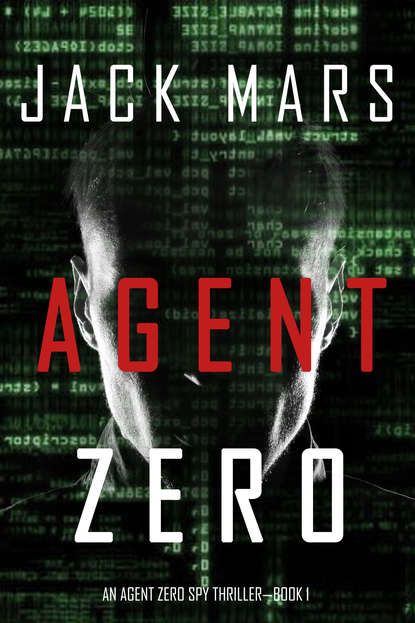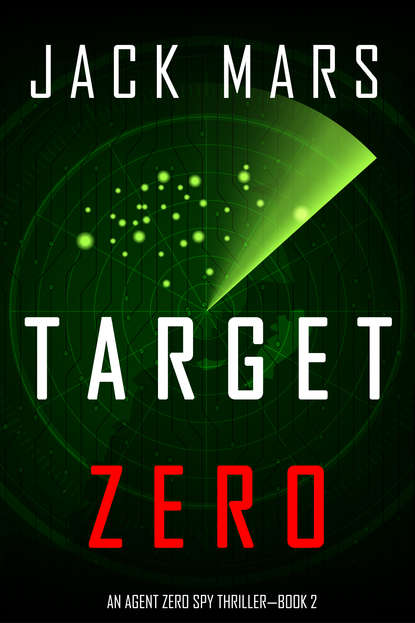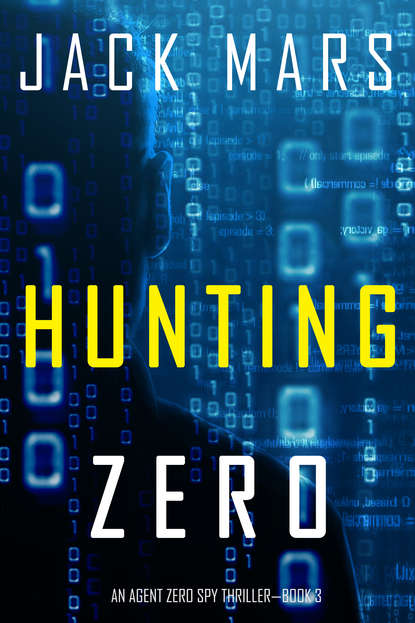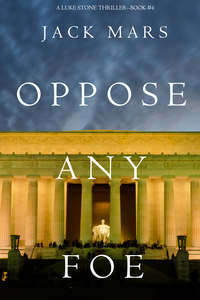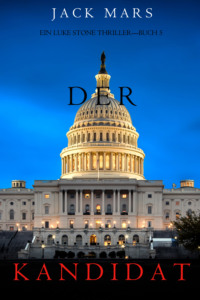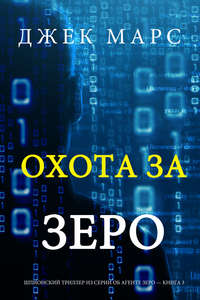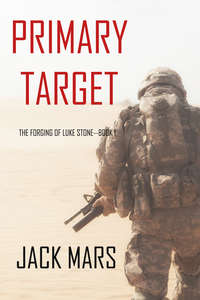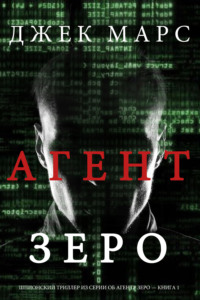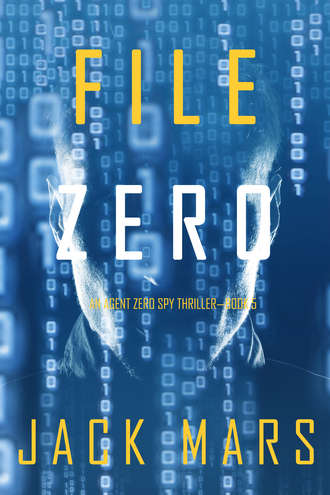
Полная версия
File Zero
So that was their next play. The Brotherhood’s attack on American soil would stir the people into a state of xenophobia against Iranians, and the “attack” on the USS Constitution was a timely follow-up to incite a war. The president would meet with his advisors, and they would convince him that a renewed conflict in the Middle East was their only course of action.
Unless, he thought suddenly, he had a new advisor.
He pulled a card out of his pocket and dialed the number on it.
“Sanders,” answered the female aide who had approached him on the White House lawn.
“This is Agent Kent Steele,” he told her. “We met earlier today—”
“I recall,” she said abruptly. There was a tension in her voice, undoubtedly due to the recent events. “What can I do for you, Agent?”
“I need to speak with President Pierson.”
“I’m afraid he’s in a meeting,” said Sanders. “I’m sure you’re aware of what’s happening—”
“I am.” This time Zero cut her off. “And that’s why I’m calling. This is matter of national security, Ms. Sanders. So you can either get me a meeting with President Pierson, or you can explain to him later that you stood between him and everything that’s about to happen.”
CHAPTER EIGHT
Less than a half hour later, Zero found himself once again in the White House, being ushered down a hall toward the Oval Office. He tried to smooth the wrinkles from his shirt, though it hardly mattered under the circumstances.
He was admitted to the president’s inner sanctum, where he was surprised to find Pierson alone. Zero had expected a flurry of activity, a coterie of aides and cabinet members making calls, setting up laptop networks and communicating with a dozen different agencies and foreign powers.
Yet there was none. President Pierson rose from his desk when Zero entered, looking as if he’d aged a decade since only a few hours earlier. His tie was loosened around his neck and the top two buttons of his pressed white shirt were undone.
“Agent Steele.” Pierson stuck out his right hand, and then scoffed at himself and shook Zero’s left. “Sorry. Forgot about the hand. Jesus, this is a mess.”
“I’ve heard.” Zero glanced about the office. “I have to admit, I was expecting more of a reception.”
“The joint chiefs are gathering currently in the Situation Room.” Pierson sighed and leaned against his desk with both hands. “I’m expected there any minute. While I’m glad you’re here, Zero, I’m afraid this meeting is going to have to be postponed.”
“Mr. President,” Zero pressed, “I have information.” The fingers of his left hand lingered near his pocket, inside of which was the USB stick. “Before you convene with the joint chiefs, there’s really something I need you to—”
“Sir.” The door to the Oval Office opened just a few inches, and the face of Emilia Sanders peered in. Her gaze flitted from the president to Zero and back. “They’re ready for you.”
“Thank you, Emilia.” Pierson tightened his tie to his throat and ran his palms down the front of his shirt. “I’m sorry, Zero, but my attention is required elsewhere.”
“Sir.” He took a step forward and lowered his voice to a conspiratorial level. He had to throw a Hail Mary; there was no way he could let Pierson enter the Situation Room uninformed. “I have very strong reason to believe that you cannot trust the men that are advising you.”
The president’s brow furrowed. “What reason? What do you know?”
“I have…” Zero started, but he threw a glance over his shoulder to find a Secret Service agent standing in the doorway to the Oval Office, waiting to escort the president to the Situation Room. “I can’t explain it right now. All I need is five minutes. Alone.”
Pierson rubbed his chin. He looked tired. “Come with me.”
“Sir?”
“Sit in on this meeting. Afterwards, I’ll give you your five minutes.” Pierson started toward the door, and Zero followed. It was all he could; he couldn’t dissuade the president from attending a meeting regarding a crisis of national security. And if it would get him five minutes alone with Pierson, then he would follow him into the lion’s den.
*The John F. Kennedy Conference Room, located in the West Wing basement and known to most as the Situation Room, was the intelligence management center of the White House, more than five thousand square feet of communications equipment that allowed some of the most powerful men in the world to maintain security from a single place.
And Zero, it seemed, had just been awarded earned a seat at the table.
President Pierson swept into the room on the heels of two Secret Service members, who immediately positioned themselves on either side of the double doors that granted them access. Zero followed behind him. Now this was the flurry of activity that he had expected upon arrival; there were fourteen people occupying the long rectangular table that ran the length of the room, and every one of them stood when the president entered.
Zero glanced around quickly, scanning the faces. He recognized nearly all of them; the National Security Advisor was present, the Homeland Security Advisor, the White House Chief of Staff, Secretary of Defense Quentin Rigby, DNI John Hillis, and Press Secretary Christine Cleary, among others. He couldn’t help but note wryly that besides himself, Pierson, and Cleary, every other person in the room was a man over fifty-five.
He was mildly relieved to see that the CIA did not have a presence there. He’d half-expected to find Director Mullen or possibly even Deputy Director Riker rearing their heads. But this was a matter for heads of state, and the CIA was represented by DNI Hillis, who would be the one to relay any orders to Mullen.
“Please, take your seats.” Pierson lowered himself into the black chair at the head of the table, closest to the doors. He gestured toward the empty seat to his right and Zero took it.
Several pairs of eyes were on him as he did, but only the Secretary of Defense spoke up. Retired four-star general Quentin Rigby carried a stiffness in his neck and shoulders and wore deep worry lines in his face that suggested he had seen the worst sides of humanity, and though discerning, he was not afraid to speak his mind.
“Mr. President.” Rigby remained standing as he addressed Pierson. “I don’t think I need to remind you that what we’re about to discuss is highly discretionary—”
“Noted, General Rigby, thank you.” Pierson cut off the general with a wave of his hand. “Agent Steele is here acting as a security advisor. He’s been vetted by the CIA and has proven his capacity for discretion time and time again. Not to mention that he’s the only one in this room with any recent experience with the type of situation we’re dealing with.”
“Even so,” Rigby pressed, “it is highly unorthodox, sir.”
“I don’t think I need to remind you, General, that I am the only person that gets to decide who is in this room.” Pierson stared Rigby down.
Zero almost smirked. He had never heard Pierson speak to anyone like that; usually his approach was diplomacy and charm. On the one hand, Zero could tell that the president was bedraggled by the events. On the other, it was nice to see him showing some real backbone.
Rigby nodded and lowered himself back into his seat. “Yes sir.”
“Mr. Holmes.” President Pierson nodded to his Chief of Staff, a short balding man with owlish glasses. “If you would.”
“Of course, sir.” Peter Holmes rose and cleared his throat. “At approximately seventeen hundred hours local time, an Iranian battleship fired two rockets at the destroyer USS Constitution during a routine patrol in the Persian Gulf. Due to the recent change in ROE, with which I believe we’re all familiar, the Constitution was authorized to—”
“Excuse me.” Zero raised his hand as if he was in a classroom, cutting off the Chief of Staff. “What change in ROE?”
“The rules of engagement, Agent,” said Holmes.
“I know the acronym,” Zero said shortly. “What was the change?”
“In light of the recent attack on American soil,” Rigby cut in, “the president signed an executive order just this morning which dictates that any foreign force that fires within a specific proximity to American military personnel are to be considered hostile and dealt with using extreme prejudice.”
Zero didn’t let himself show any reaction, but his mind churned. What a coincidence, he thought. “And what is the specific proximity, General?”
“We’re not here to outline the details of an executive order,” Rigby shot back. “We’re here to discuss an extremely pressing and volatile situation.”
Rigby was dodging the question. “What was the trajectory of the rockets?” Zero asked.
“Sorry?” Holmes pushed his glasses up the bridge of his nose.
“The trajectory,” Zero repeated. “Angle of ascent, descent, type of rocket, proximity, anything. How much of a threat was this ship to the Constitution?”
“Enough of a threat for a captain in the United States Navy to make a judgment call,” said Rigby forcefully. “Are you questioning the captain’s judgment, Agent Steele?”
I’m questioning his motivations, he nearly said. But he held his tongue. He couldn’t afford to tip his hand again like he had twice already. “Not at all. I’m merely suggesting that there are three sides to this story. The captain’s, the Iranians’, and the truth. What about cameras?”
“Cameras,” Rigby repeated flatly. He flashed a patronizing smirk. “Do you know a lot about destroyer-class ships, Agent?”
“Can’t say I have a lot of experience.” This time Zero flashed a smirk of his own. “All I know is that the USS Constitution is an Arleigh-Burke class destroyer, built in 1988 and first commissioned in 1991. They were the only US destroyer class used from 2005 to 2016, until the Zumwalt class was commissioned. The Constitution would be outfitted with an Aegis integrated weapons system, antisubmarine rockets, a passive electronically scanned radar array, and Tomahawk missiles—the latter of which I’m assuming was used to destroy the Iranian vessel and claim seventy-six lives. Considering it is one of the most technologically advanced machines on the entire ocean, and that it’s carrying enough firepower to conquer any number of banana republics, I would assume that cameras weren’t out of the question.”
Rigby stared him down for a long moment. “No cameras picked up the angle of attack,” he said finally. “But you’re welcome to read the captain’s report if you’d like.” The general slid a folder Zero’s way.
He opened it; the first page was a very brief report, only a few paragraphs, from a Captain Warren. The details were sparse. Warren claimed simply that an IRGC ship fired two rockets at the Constitution. Neither hit, but the attempt was deemed enough of a threat for Warren to make the judgment call to return fire—with, as Zero had predicted, eight Tomahawk missiles. The enemy ship had been obliterated.
Not only was it overkill, but that was the only part of the report that Zero actually believed. Anything else would have been easy to falsify. The Persian Gulf, and Captain Warren, was thousands of miles away. Far from anyone being able to question him meaningfully.
“Brass tacks,” said Rigby, “are that Iran is publicly considering this an act of war. They say we fired first. We say they fired first. There’s been no formal declaration of war from them, but the American people are going to expect a definitive answer. We cannot abide another attack—”
“Another attack?” Zero interjected again.
Rigby blinked at him. “Were you not in the Midtown Tunnel at the time of the bombing, Agent? When hundreds of American lives were lost?”
Zero shook his head. “That was the work of a radical terrorist faction that consisted of less than twenty men. Not an entire nation or region.”
“Tell that to the American people,” Rigby argued.
Zero said nothing in response, but he knew in that moment that his assumption was right. The conspirators wanted to use the recent attack as a way to rally the people to the cause of war.
“All right,” Pierson cut in, holding up a hand. “Let’s take a step back here. Roland, what sort of global responses are we seeing?”
The Secretary of State, Roland Kemmerer, quickly scanned his notes as he spoke. “Bad news first, I suppose. Intelligence and satellite recon suggests that Iran is already seeking allies in Iraq and Oman, as well as some Syrian nationalist groups. If they banded together, they would have the ability to close the Strait of Hormuz.”
There was a moment of reverential silence to allow the comment to sink in before Rigby said, “You know how detrimental that could be, Mr. President.”
“Not only would that eliminate a strategic advantage for the Fifth Fleet,” Holmes added, “but we could be facing a major economic downturn.”
“A recession, to say the least. Possibly worse.” Kemmerer shook his head.
Zero bit his tongue to keep from reacting. Sons of bitches. This was as rehearsed as a play. They’d been waiting for years for this exact moment. He never would have imagined that he would be present for it, yet here he was, sitting in the Situation Room as these warmongers attempted to sway a president.
Pierson rubbed his chin pensively. His face was ashen; not only was he the sole person responsible for whether or not America would go to war, but a recession was clearly not something he had considered previously. “Is there any good news?”
The Secretary of State sighed. “Eventually. The UN wants to investigate the incident. The European Union, China, Japan, and most other allies are already issuing proclamations of neutrality in any future conflict that might arise. Except for one.”
Zero knew it well before Kemmerer even said it.
“Russia.” The Secretary of State fidgeted slightly in his seat. “It seems their own trade agreements with Iran have been deteriorating. They’re ready to lend their support if we need it.”
“President Ivanov has already pledged resources to our cause if we decided that it was in our best interests,” said Holmes.
“War,” the president murmured. “Might as well call it what it is. If war is in our best interests.”
Zero glanced over at Pierson. The president’s complexion had taken on a sallow aspect, and he stared blankly at the shiny mahogany tabletop. Despite how adept Zero was at reading expressions and tells, he couldn’t say whether or not Pierson was buying the load of bullshit that his cabinet was selling. But if he had to guess, he would say that Pierson was caving.
“General Rigby,” the president asked, “what’s your position?”
Here it comes. The blatant advice that the US go to war in the Middle East.
“It is my position that we mobilize the Fifth Fleet,” said Rigby, “and show them our full potential in the Persian Gulf. We can call in additional assets from the Gulf of Oman. But…” The general paused and shook his head. “I cannot advise that we initiate a war over this.”
Zero balked. He couldn’t hide his reaction this time; his mouth fell open slightly at the general’s remark. Rigby was playing a part, he was certain, but it was still a curveball.
“I believe that we should hold our position in the Gulf and let the Iranians know that we want to avoid conflict in any way possible,” he continued. “If they act, we react, but until then, we stay the course.”
“With all due respect, General,” said Holmes, “I’m not sure that perspective will sit well with the American people in the wake of recent events.”
“No,” Pierson agreed, “but the general is right. We can’t allow this situation to get blown out of proportion, and I don’t believe the Iranians are going to declare war without further provocation. Mr. Holmes,” he addressed his Chief of Staff, “let’s begin immediately on an address to the nation. We’ll explain that the attack in the Persian Gulf did not result in any loss of American life, and that we will not be goaded into any hostilities.”
“Yes sir, Mr. President.”
Zero’s mind was working a mile a minute. He had fully expected this to be the meeting in which the US declared war on Iran and took swift action to control the Strait of Hormuz…
Oh. The realization struck him like a brick to the head. To declare war now would make their intentions too obvious. He, Agent Zero, had figured it out, and while he knew he was fiercely intelligent—there was that hubris again—others were too. Someone else could assume the same as him. No, these people had years to plan this. They weren’t in any rush.
He had thought, had assumed that this entire meeting was the play. But this was just the rehearsal. Which meant… There is going to be something else. Not an attack. Not a fight.
Конец ознакомительного фрагмента.
Текст предоставлен ООО «ЛитРес».
Прочитайте эту книгу целиком, купив полную легальную версию на ЛитРес.
Безопасно оплатить книгу можно банковской картой Visa, MasterCard, Maestro, со счета мобильного телефона, с платежного терминала, в салоне МТС или Связной, через PayPal, WebMoney, Яндекс.Деньги, QIWI Кошелек, бонусными картами или другим удобным Вам способом.


